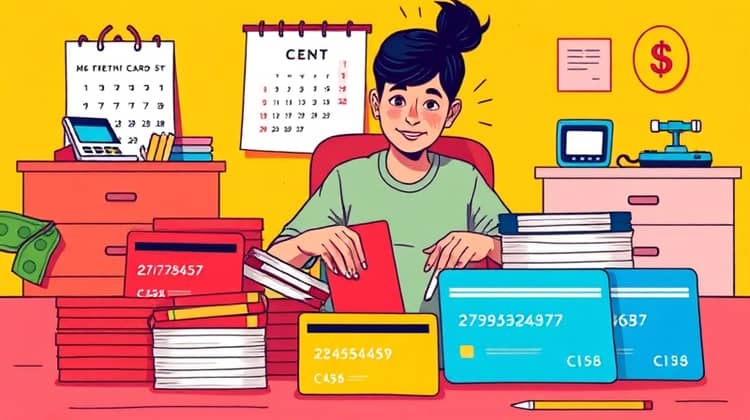Credit Card Management: 6 Essential Tips for Financial Hardship

Managing credit cards can be challenging, especially during financial hardship. Many people find themselves overwhelmed with debt, accruing interest, and facing late fees. However, understanding how to manage your credit card situation effectively can bring you back on track toward financial stability.
This article outlines six essential tips that can help you navigate through difficult times. By following these steps, you'll learn how to assess your financial situation, prioritize your debts, negotiate with creditors, and much more.
Taking control of your finances is not just about paying off debt; it's about creating a sound financial future for yourself. Let's dive into the strategies that could help you ease your burden and manage your credit cards wisely.
1. Assess Your Situation

Before taking any steps to manage your credit cards, it's crucial to assess your current financial situation. Knowing exactly how much you owe, your income, and your expenses will give you a clearer picture of what you’re dealing with.
Start by gathering all your credit card statements, bank statements, and any other relevant financial documents. Write down your total debts, monthly income, and fixed expenses to understand where you stand financially.
- Total your credit card debt: List out each card and the amount owed.
- Calculate your monthly income: Include your salary and any additional income sources.
- List your monthly expenses: Include fixed and variable expenses to see what you spend your money on.
Once you have a clear understanding of your financial situation, you can make informed decisions about how to handle your debt. This initial assessment is vital before moving forward with any plans or strategies to manage your credit cards.
2. Prioritize Your Debts

Not all debts are created equal. When managing credit card debt, it's essential to prioritize them based on interest rates and payment schedules. This will help you focus your energy on the debts that are most urgent or costly.
Consider adopting the snowball method, where you pay off your smallest debts first for motivation, or the avalanche method, where you focus on the highest interest debts to save money over time.
- Pay off cards with the highest interest rates first, as they cost you more money over time.
- Focus on cards with the smallest balances if you need quick wins to boost your confidence.
- Make minimum payments on lower priority debts while focusing on higher priority ones.
By prioritizing your debts, you can determine which ones to tackle first, creating a strategic approach to pay down what you owe effectively. This will streamline your debt repayment process and provide you with a sense of control over your financial obligations.
3. Negotiate with Creditors

If you're struggling to make payments, don't hesitate to reach out to your creditors. Many banks and credit card companies have programs in place for struggling customers. It’s better to communicate than to avoid the situation, which can lead to more severe consequences like collections or bankruptcy.
When negotiating, be honest about your financial situation, and don’t hesitate to ask for lower interest rates, waived fees, or a temporary delay in payments to help you regain your footing financially.
- Request an interest rate reduction on your credit card balance.
- Ask if they offer any hardship plans or payment arrangements.
- Inquire about specials or discounts they may offer for early payoff.
Negotiating can provide immediate relief and help make your payments more manageable, allowing you to focus on regaining control over your finances.
4. Explore Balance Transfer Options

If you have high-interest debt, one way to manage your credit cards better is to explore balance transfer options. By transferring your balance to a card with a lower interest rate, especially one that offers 0% interest for an introductory period, you can save significantly on interest payments.
However, be sure to check for any transfer fees, and remember that your ultimate goal should be to pay down the outstanding balance during the introductory period.
- Research credit cards with promotional balance transfer offers.
- Consider the fees associated with the transfer to ensure it’s beneficial.
- Plan your strategy to pay off the transferred balance within the promotional period.
Using balance transfers wisely could be a game-changer in managing your credit card debt, as it allows you to redirect payments that would have gone to interest into paying off the principal faster.
5. Create a Realistic Budget

Establishing a budget is essential for successful credit card management. A realistic budget helps you account for your monthly income, expenses, and potential savings or debt payments, giving you a clear direction on managing your funds effectively.
Start by documenting all your monthly expenses and distinguishing between needs versus wants. This will aid you in allocating funds appropriately and avoiding unnecessary expenditures to make room for debt repayment.
- Track your income and expenses monthly to stay aware of your spending habits.
- Prioritize necessary expenses (like housing and food) over discretionary spending.
- Set aside a fixed amount every month specifically for debt repayment.
By creating and sticking to a budget, you not only keep your finances in check but also pave the way for effective debt management strategies that can ultimately assist you in overcoming financial hardship.
6. Seek Professional Help

If managing your credit card debt becomes overwhelming, don't hesitate to seek professional help. Credit counseling agencies can provide financial advice and help you create a plan tailored to your unique situation. They can also negotiate on your behalf with creditors.
Finding a reputable credit counseling service can lead to better management of your debts and provide resources that may not be available to you on your own.
- Research trusted credit counseling services in your area or online.
- Look for nonprofit organizations to avoid any hidden fees.
- Consult with a counselor to evaluate your financial situation and develop a plan.
Professional help can serve as a valuable resource for dealing with difficult financial situations, offering guidance and support as you work through your credit card management journey.
Conclusion

In conclusion, managing credit card debt during financial hardship can be daunting, but with the right strategies in place, it is possible to regain control. Assessing your situation, prioritizing debts, negotiating with creditors, exploring balance transfer options, creating a budget, and seeking professional help are all crucial steps that can help you make progress.
Remember that taking action, no matter how small, can lead to significant changes in your financial situation over time. It's all about creating a comprehensive plan that works for you.
Stay focused, be patient with yourself, and continuously educate yourself about personal finance, as this is an evolving process that requires ongoing commitment and adjustments based on your changing financial landscape.






